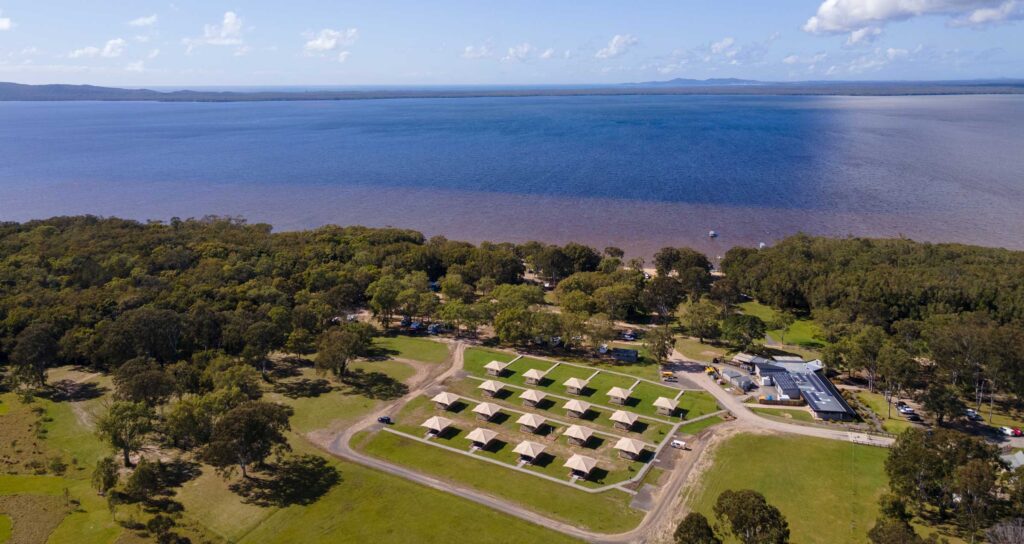A SUSTAINABLE TOURISM EXPERIENCE
The team at Habitat Noosa feel privileged to deliver sustainable tourism experiences. There are few locations in Queensland that offer such an incredible place to work and showcase the natural beauty of our property to customers.
The area was once part of a large 4,000-acre cattle station, where livestock would roam right down to the water’s edge.
Rehabilitation
Rehabilitation of the area commenced in the 1980’s and continues today, Habitat Noosa is living proof of the capacity to revitalise, rejuvenate and promote the core values of sustainable eco-tourism and business management.
The team at Habitat Noosa strive to inspire and educate guests so they can understand the importance of protecting, preserving and improving the region for future generations.


COMMITMENT
Operating in such an ecologically diverse region demands a rigorous and transparent commitment to environmental sustainability, backed by sound business practices such as managing wildlife habitats, reducing energy use, minimising waste and conserving water.
We endeavour to foster these core values with our employees and sustainable education to our customers.
| CATEGORY | New and ongoing initiatives
|
How the environment / customer benefits
|
| Energy | 110 solar panels are utilised onsite, producing a 40 kilowatt system
• All appliances utilised on property are labelled energy saving devices.
• Electrical appliances and computers are turned off at night
• LED lights are utilised throughout the property
• Only 10% of the parks campsite capacity can access powered sites
|
Solar panels currently produce 65 megawatts per annum - which is approximately 65% of annual power usage. Powered Campsites are directly linked to this solar circuit, resulting in Campers feeling like they have contributed to the cause and reduced their carbon footprint.
Energy saving. Reducing consumption on non-essential usage and creating ownership for employees.
LED and low impact lighting in external areas to protect nocturnal wildlife habitats.
90% of the parks campsite capacity are on sustainable unpowered sites. |
| Water |
Habitat Noosa sources water from an onsite bore
Property has water saving devices on all faucets, we have controlled times for the use of shower blocks.
|
Habitat Noosa harvests water independently, therefore not using water from the grid.
Potable water is treated on site and stored in 250,000 litre tanks
The average daily consumption of water in our region is 155 litres p/p, per day. Bore log data collected highlights an average usage of 74 litres p/p, per day
|
| Sewerage Disposal |
Sewerage disposal system, not reliant upon the grid. This is a large investment, 6 settling ponds located 1km away on a separate lease. The Ponds are evaporative, hence leaving ZERO footprint
|
Provides significant benefits to the environment. Each year, over 10 million litres of effluent is processed, treated and evaporated into the atmosphere. The system is 100% biodegradable and unique to Habitat Noosa |
| Cleaning | Habitat Noosa uses only eco sensitive cleaning products from the BIO-GREEN range | Habitat Noosa uses only eco sensitive cleaning products from the BIO-GREEN range |
| Single Use Plastics |
Food and Beverage outlets endeavour to supply reusable glassware or crockery / silverware to avoid single use plastics.
• Fully recyclable coffee cups are used and reusable coffee cups are encouraged.
• No plastic straws .
• Partnership with Plastic Free Noosa
|
Habitat Noosa measures and manages waste outputs by correlating data of occupancy (vs) kilograms of waste to landfill
ABS Statistics demonstrate the average Australian creates 1.47kg of household waste p/p per day
Waste output from the business is measured at 1.06kg p/p per day
|
| Waste Management & Recyling |
• Marketing strategy is mostly digital, utilising systems such as QR codes instead of print materials.
• The Company promotes our reuse and recycle strategy throughout the property via posters and information boards aiming to educate our customers of our core values.
• Food scraps are segmented in our kitchen and are collected by local produce suppliers and free range farmers where we purchase out meat products.
• Oil from our commercial fryer is donated to local businesses who convert it into Biodiesel.
|
Our recycling program works in conjunction with the Noosa Council. Landfill separated from recycling is a key aspect of waste management and environmental impacts.
Landfill waste totals produced from the facility are approximately 64 tonnes per annum (or) 1.06kg p/p per day. Well below the average waste produced p/p in Australia of 1.47kg p/p per day
Recycling waste totals produced from the facility are approximately 40 tonnes per annum
|
|
Waste
|
Containers eligible for cash deposit scheme are collected by the Pomona/Noosa Lions Club. | An estimated $5,800 per year which directly benefits the Lions Club and supports community organisations |
| Education |
Upon arrival customers are given a brief instruction to clearly explain they are residing in a National Park and have a responsibility to act accordingly.
Eg, avoiding interaction with local wildlife, no domestic animals and the observation of fire bans
• Guests are given QPWS walking guides which ensure guests will only hike on designated hiking trails.
• Habitat Noosa has adopted the mantra of “Take only photos and leave only footprints.” Staff are encouraged to promote this philosophy to all customers
|
Outcomes from this initiative are the education of our customers and employees. In turn, our environmental accountabilities are enhanced
Thousands of people reside at the property each year and without a commitment to communication and engagement, our core values cannot be met
Our customers contribute a significant amount to the business initiatives
|
| Customer reducing their carbon footprint | Guests support our core values. This has resulted in an increase of visitation from guests with “off the grid” caravans, campers, that are attracted to Habitats environs that in turn contribute towards lowering their consumption and the companies carbon footprint. |
Reduction in the standard household consumption of
• Water
• Energy
• Waste (ie in their bins)
Collective outcomes produce sustainable results.
|
Habitat Noosa is primarily a “self-sustainable” business, leading the market with the development in infrastructure to deliver minimal environmental footprint. Environmental accountabilities form the pillars of our corporate charter. The Company harvests its own water, generates 65% of its energy requirements and processes all of its own grey water waste.
TREAD LIGHTLY & TRAVEL FOR GOOD
Not just about an exploration of places, but a conscious embrace of responsible travel, cultivating a sense of mindfulness and connection to Noosa.

